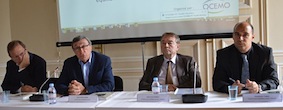 Identify a new growth model, achieve successful political transition, continue opening up to international markets while giving the younger population their confidence back, break connivances between government and economic actors… The countries of the Mediterranean basin must inspire “a new dynamic in order to sustain economic and social balances”, underlines Femise’s annual report, presented in detail on the 20th of May 2014 in Marseille.
Identify a new growth model, achieve successful political transition, continue opening up to international markets while giving the younger population their confidence back, break connivances between government and economic actors… The countries of the Mediterranean basin must inspire “a new dynamic in order to sustain economic and social balances”, underlines Femise’s annual report, presented in detail on the 20th of May 2014 in Marseille.
For 20 years, the Mediterranean Institute (Institut de la Méditerranée), from its headquarters in Marseille, has been contributing to knowledge about the countries on the south bank.
Meeting on the occasion of this anniversary, on the 20th of May at Villa Valmer, economists and regional government representatives presented new avenues for rebuilding, in each country, a new social contract. One avenue involves developing culture in the Mediterranean region.
“For two years now we have been working to develop a nomenclature aimed at supporting projects of this nature. In France, culture generates €57.8 billion per year!” highlights Henry Roux-Alezais, president of the Mediterranean Institute. The challenge is to respond to the aspirations of the population by restoring confidence and thereby helping to attract national and international investment.
Promote technical training
These countries must continue opening up to international markets and develop activities which present a relative advantage. Neglected and unemployed, young graduates are looking to leave. It is time to encourage creativity and innovation, to reinvent a horizon of understanding, to facilitate intercultural communication and to listen to moderate Islamists”, advises Jean-Louis Reiffers, president of Femise ’s Scientific Committee and coordinator of the 2013 report completed in partnership with the French Agency for Development (AFD).
Constantin Tsakas, Femise’s interim general manager, reports a “chronic problem in terms of the labour market” and “a lack of well-trained human capital”. He puts forward as evidence “the poor scores obtained in international evaluations of students and low rates of employability among graduates”.
Promote regional integration
“Technical training suffers from a poor image compared with traditional courses. What level of cultural and psychological shock is needed for professional training to gain credibility?” asks Roger Goudiard, president of the CEFEB in Marseille (the AFD’s Training centre).
In a context where Europe, Mediterranean countries’ principle economic partner, has been experiencing reduced consumption since the economic crisis set in, why not prospect new markets and strengthen trade with neighbouring countries? “Every Mediterranean country would be wise to move towards greater regional integration in order to open businesses up to a much wider market, to develop production networks and put in place ambitious joint projects across all areas (infrastructure, energy, innovation, training etc.)”, suggests Constantin Tsakas.
From left to right : Roger Goudiard, Henry Roux-Alezais, Jean-Louis Reiffers et Constantin Tsakas. (Photo N.B.C)-
Article par Nathalie Bureau du Colombier, Econostrum. www.econostrum.info.
Enregistrez-vous pour le newsletter Econostrum:http://www.econostrum.info/subscription/


